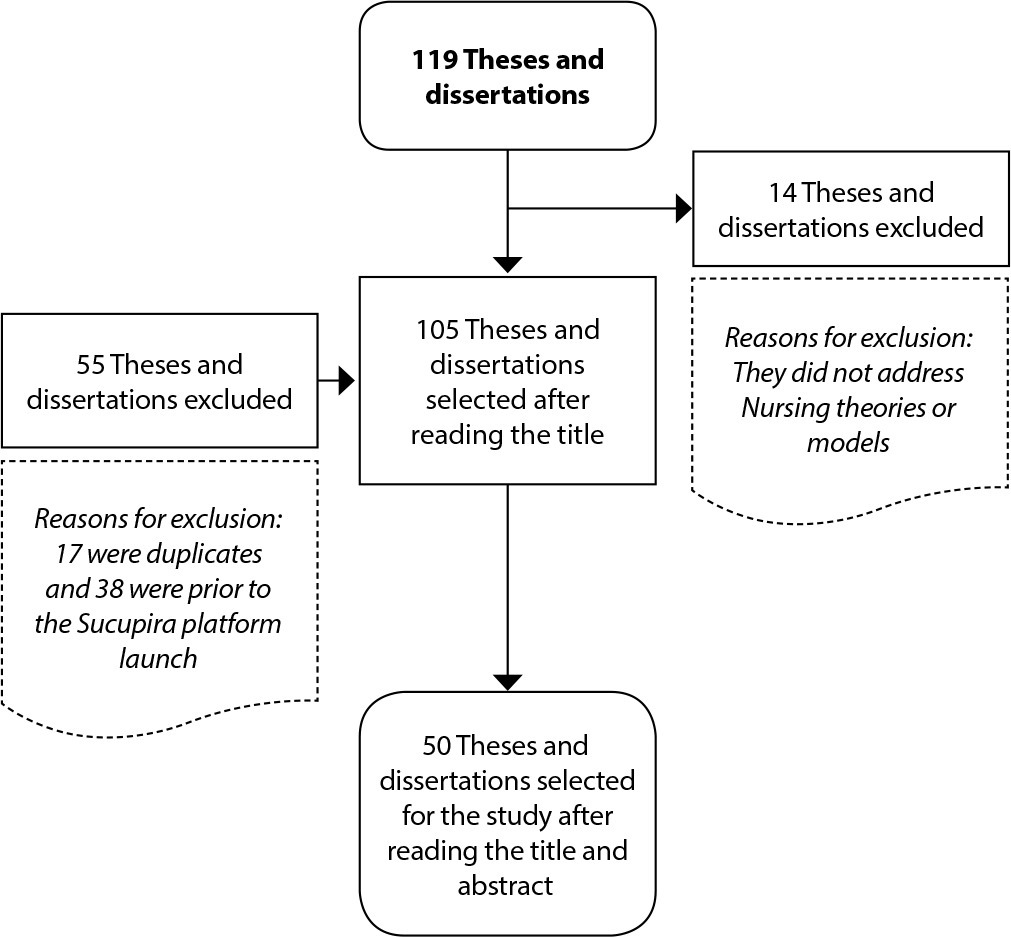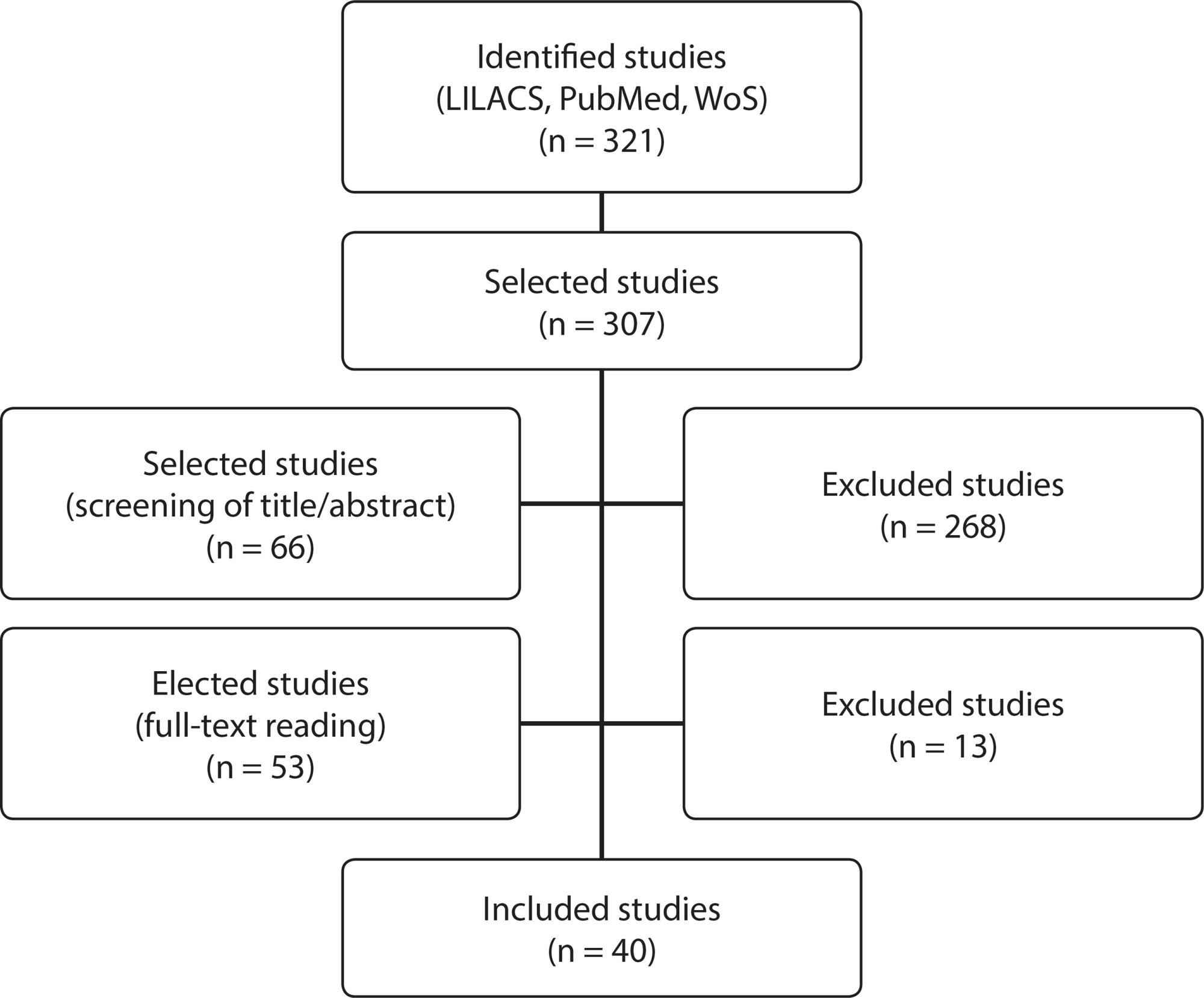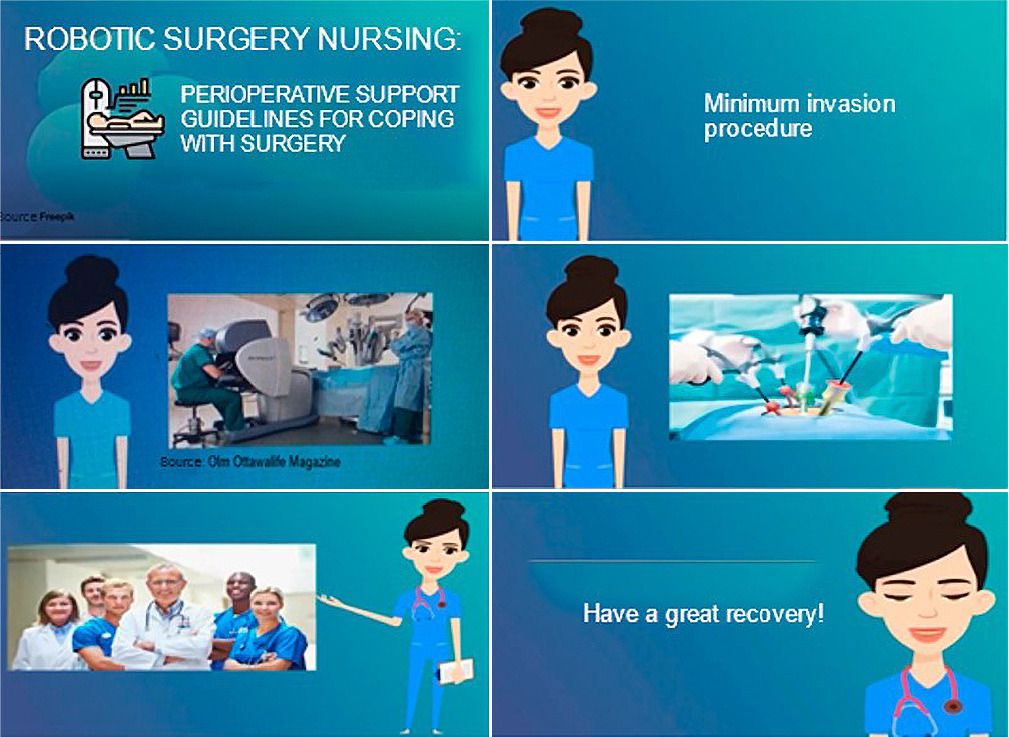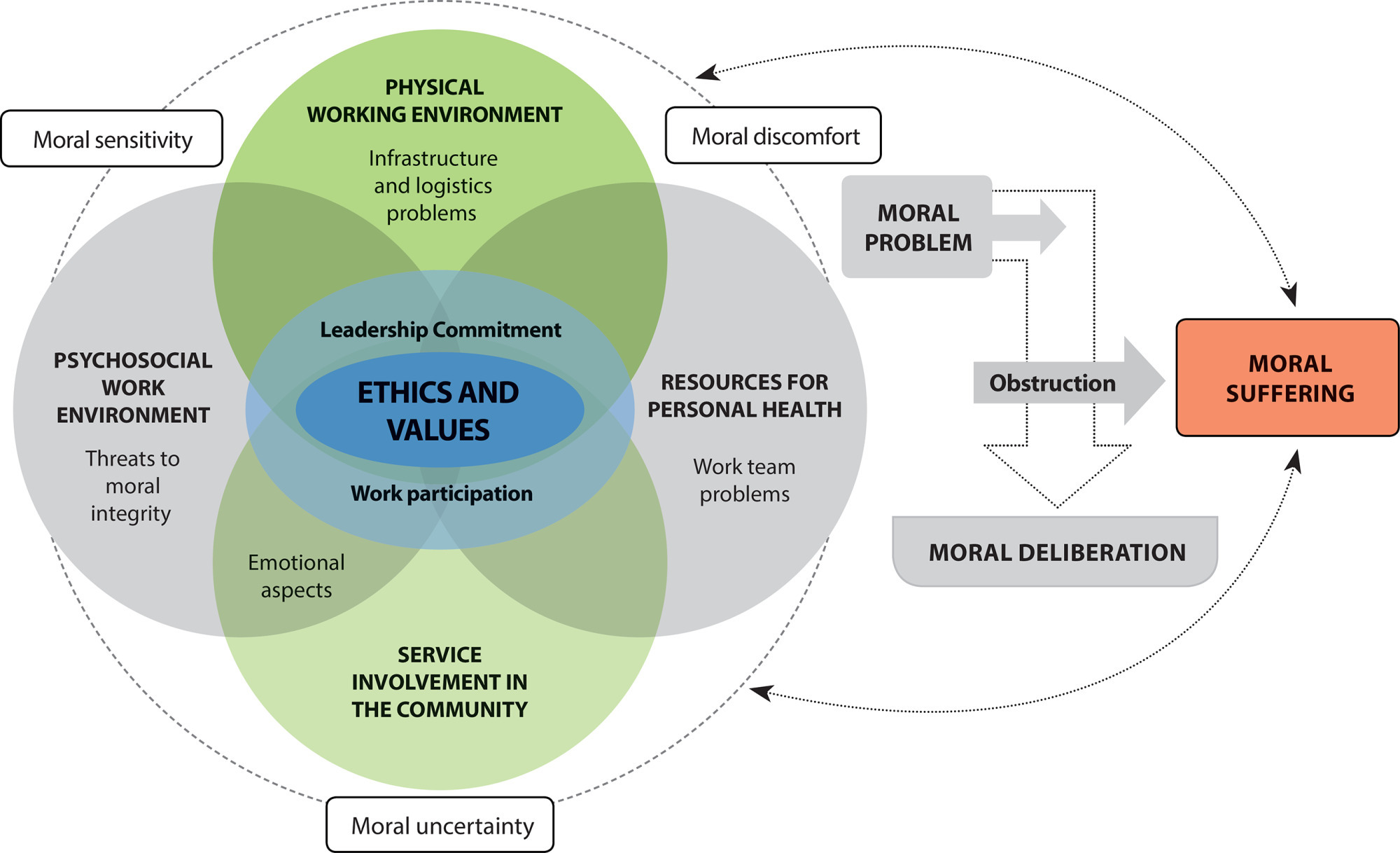-
RESEARCH01-01-2018
Introduction of the School Health Program in the city of Cascavel, Paraná State: report of nurses
Revista Brasileira de Enfermagem. 2018;71:1540-1547
Abstract
RESEARCHIntroduction of the School Health Program in the city of Cascavel, Paraná State: report of nurses
Revista Brasileira de Enfermagem. 2018;71:1540-1547
DOI 10.1590/0034-7167-2017-0188
Views1See moreABSTRACT
Objective:
to understand the introduction of the School Health Program in the city of Cascavel, Paraná State, as opposed to the report of nurses.
Method:
a qualitative study with fifteen participants. The data were collected from April to August 2015, through semi-structured interviews, analyzed by content analysis and thematic modality.
Results:
the category “Introduction process” of the School Health Program integrates the subcategories “Identified health problems” and the “Challenges of intersectoriality”. The program was implemented quickly, with a fragile training of professionals to perform in the phases that compose it. Structural conditions of schools, human and material resources, and emerging intersectoral interaction were identified obstacles. The integration of the health, school, and family constitutes the program’s potentiality.
Final considerations:
it is understood that the actions of the program were based on health assessments of students, and it is necessary for professionals and managers to discuss and analyze the obstacles identified to achieve all the proposed objectives.
-
RESEARCH01-01-2018
Teaching-learning tendencies and strategies used in the leadership development of nurses
Revista Brasileira de Enfermagem. 2018;71:1531-1539
Abstract
RESEARCHTeaching-learning tendencies and strategies used in the leadership development of nurses
Revista Brasileira de Enfermagem. 2018;71:1531-1539
DOI 10.1590/0034-7167-2017-0455
Views0See moreABSTRACT
Objective:
To identify the tendencies and teaching-learning strategies used for leadership development in the discipline Nursing Administration in higher education institutions in Brazil.
Method:
Non-experimental, type survey, descriptive and exploratory, cross-sectional, with quantitative approach.
Results:
The dialogued lecture strategy was cited as used by 241 (91%) professors, followed by research, by 237 (89%), and discussion or group work, by 221 (83%). Strategies not used were: spiral learning, 166 (63%), and online programs, 151 (57%) professors. The strategy that presents higher tendency of use is that of online courses, 104 (39%).
Conclusion:
among the strategies mentioned, all are aligned with the directions given in the literature for nursing education, but these strategies and methodologies influence the formation of leader nurses differently.
-
RESEARCH01-01-2018
Plataforma PEnsinar®: a learning tool for teaching the nursing process
Revista Brasileira de Enfermagem. 2018;71:1522-1530
Abstract
RESEARCHPlataforma PEnsinar®: a learning tool for teaching the nursing process
Revista Brasileira de Enfermagem. 2018;71:1522-1530
DOI 10.1590/0034-7167-2016-0411
Views0See moreABSTRACT
Objective:
to describe the construction and transition phases undertaken in the development of a virtual learning environment named Plataforma PEnsinar® (PEnsinar Platform®). This platform aims at teaching the nursing process and the nursing classifications NANDA International, NIC, NOC and ICNP®.
Method:
this is a methodological and technological development research that used construction and transition phases of the software development process named Rational Unified Process.
Results:
the software was developed in the construction phase. Unit and integration tests of components of interfaces were held. In the transition phase, the complete system was showed to the users. It was completely working considering the applicability and employment, under conditions to be implemented and evaluated.
Conclusion:
the study showed how the construction and transition phases of the Plataforma PEnsinar® were developed. It was based on a proposal that inserts the student as an active agent in the nursing process and the professor as a mediator, providing tools that will contribute to a better learning.

-
RESEARCH01-01-2018
Clinical and management skills for hospital nurses: perspective of nursing university students
Revista Brasileira de Enfermagem. 2018;71:1514-1521
Abstract
RESEARCHClinical and management skills for hospital nurses: perspective of nursing university students
Revista Brasileira de Enfermagem. 2018;71:1514-1521
DOI 10.1590/0034-7167-2017-0452
Views0See moreABSTRACT
Objective:
to analyze nursing university students’ perception of the professional skills to act in the hospital setting developed during their academic training, and what strategies are being created for the development of these skills during their performance.
Method:
an exploratory, qualitative study in which 40 nursing university students participated. The data were collected from September to December 2016 and conducted thematic inductive analysis.
Results:
clinical skills were identified that could be learned and previously developed at the undergraduate level; and management skills learned during undergraduate education and developed only in the hospital environment. Strategies for the development of skills were identified, such as individual study and Permanent Education, by the employing institution.
Final considerations:
it was evidenced that college contributed in significant proportions for learning and development of some clinical and management skills in the hospital. Still, despite the identified strategies, managers and training centers need to continuously implement strategies for the development of new skills in nurses.
-
RESEARCH01-01-2018
Nursing educational intervention for the identification of Adverse Events in hemodialysis
Revista Brasileira de Enfermagem. 2018;71:1507-1513
Abstract
RESEARCHNursing educational intervention for the identification of Adverse Events in hemodialysis
Revista Brasileira de Enfermagem. 2018;71:1507-1513
DOI 10.1590/0034-7167-2017-0843
Views0See moreABSTRACT
Objective:
To develop an educational program aimed at the qualification of the nursing technicians that makes possible the understanding of Adverse Events (AE), aiming to adapt the data records; to elaborate tools for the records of the AE in hemodialysis patients; and to assess the knowledge before and after the educational program.
Method:
An educational intervention was conducted through a classroom and online course on how to recognize and record AE in hemodialysis. The effectiveness of the program was assessed through the gain of knowledge measured through online record of the AE in fictitious problem cases before and after the course.
Result:
Sixteen nursing technicians participated in the study. In the initial test, the mean score was 3.7 ± 0.3 points and in the final assessment was 4.2 ± 0.3 points (p=0.0002).
Conclusion:
It was possible to verify that the educational intervention contributed to increase the knowledge of the participants and that the training of these can be achieved with classroom and online learning courses.
-
RESEARCH01-01-2018
Nursing laboratory and critical education of nurses: approaches and distances
Revista Brasileira de Enfermagem. 2018;71:1500-1506
Abstract
RESEARCHNursing laboratory and critical education of nurses: approaches and distances
Revista Brasileira de Enfermagem. 2018;71:1500-1506
DOI 10.1590/0034-7167-2017-0339
Views1See moreABSTRACT
Objective:
to analyze the contribution of the laboratory of nursing to the critical education of nurses.
Method:
qualitative study, conducted among 18 professors of higher education institutions, being one public and the other private. Data were collected between February and November of 2016 by means of semi-structured interview. To analyze data, it was used a content analysis in the thematic modality.
Results:
it was observed the emphasis in the technical skills development by propagation of behavior and practices; the creation of bonds between professors and students happens on the limit of good interpersonal relationship; the laboratory of nursing may help the critical reflection about the practice, being a place that allows the learning of ethics.
Final considerations:
the nurse education, carried out by the laboratory of nursing, have to overcome the emphasis in the uncritical reproduction of practices and to observe the nurse’s power to think about the reality in the meaning of its modification.
-
RESEARCH01-01-2018
Students’ knowledge of metabolic syndrome after educational intervention
Revista Brasileira de Enfermagem. 2018;71:1493-1499
Abstract
RESEARCHStudents’ knowledge of metabolic syndrome after educational intervention
Revista Brasileira de Enfermagem. 2018;71:1493-1499
DOI 10.1590/0034-7167-2017-0342
Views1See moreABSTRACT
Objective:
To analyze the knowledge of children and adolescents about risk factors for metabolic syndrome (MS) before and after educational interventions.
Method:
A quasi-experimental, comparative, prospective and intervention study conducted in 2015 and 2016 with 43 students in the city of Picos (state of Piauí-PI). Five health education meetings were held. For the knowledge analysis, was applied a questionnaire at three different moments.
Results:
Participants’ mean age was 12.6 years (± 2.1), of which 60.5% were female. The ‘More than good’ level of knowledge went from 20.9% to 55.8% after interventions. When evaluated late, students maintained a higher level of knowledge compared to before the interventions. Most said they were able to change their lifestyle after educational meetings.
Conclusion:
The educational intervention promoted increase of knowledge and stimulated changes in attitudes related to risk factors associated with MS.
-
RESEARCH01-01-2018
Work engagement among participants of residency and professional development programs in nursing
Revista Brasileira de Enfermagem. 2018;71:1487-1492
Abstract
RESEARCHWork engagement among participants of residency and professional development programs in nursing
Revista Brasileira de Enfermagem. 2018;71:1487-1492
DOI 10.1590/0034-7167-2017-0278
Views0See moreABSTRACT
Objective:
to assess the levels of engagement at work of nurses enrolled in multi-professional residency and professional development programs in health care of a Brazilian public institution.
Method:
a cross-sectional study with 36 professionals. The data were collected in September 2013, with use of the Utrecht Work Engagement Scale (UWES), composed of seventeen self-evaluation items with the dimensions vigor, dedication and absorption, as well as an overall score.
Results:
the levels of engagement ranged from 3.8 to 4.3, and the standard deviations, between 1.1 and 1.3. Nurses showed average levels on vigor (3.8) and absorption (3.9) dimensions, and high levels on dedication (4,3) and engagement (4.0).
Conclusion:
the professionals presented good levels of energy, resilience, enthusiasm and involvement with the work. They are satisfied with the activity and are dedicated to it, which promotes the acquisition of skills and competences along the in-service training, ensuring a future professional practice of quality.
Search
Search in:
Nuvem de Tags
Enfermagem (930)Cuidados de Enfermagem (269)Atenção Primária à Saúde (239)Idoso (208)Educação em Enfermagem (151)Segurança do Paciente (150)Saúde Mental (145)Educação em Saúde (139)Estudos de Validação (131)Qualidade de Vida (104)Tecnologia Educacional (100)Promoção da Saúde (99)COVID-19 (91)Criança (91)Família (87)Enfermagem Pediátrica (86)Saúde do Trabalhador (86)Adolescente (85)Saúde Pública (82)Estudantes de Enfermagem (77)








